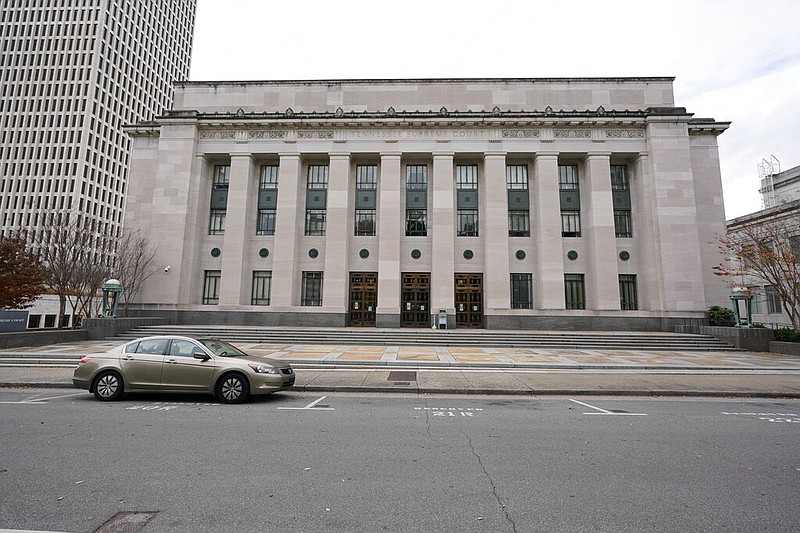NASHVILLE - Tennessee Gov. Bill Lee on Wednesday signed into law a bill setting up special three-judge panels to hear constitutional challenges to state laws, executive orders, regulations and legislative redistricting cases.
But Chattanooga attorney Lee Davis says he believes the law itself is unconstitutional, charging it violates the separation of powers, a doctrine of constitutional law in which all three branches of government are co-equal and kept separate.
Davis told the Times Free Press that while he thinks House Bill 1130/Senate Bill 843 is both "unworkable" and "irresponsible," he sees a "real problem" in provisions regarding likely challenges to legislative reapportionment and redistricting in 2022.
That's when the General Assembly, which has a Republican supermajority, will draw new district lines for the state's nine Congressional seats and all 99 state House and 33 state Senate seats.
Davis said before the judicial panels are allowed to render a ruling that a redistricting plan doesn't meet legal requirements, the new law - which takes effect July 1 - requires the three-judge panels hearing the case to bring the problem to the legislature to correct.
"And that is unconstitutional," Davis said.
The three-judge panel could not write an opinion "expressing the constitutional problem, they have to come to the legislature and get the legislature's attempt to fix it," Davis added. "So does that mean the three judges are now law clerks for the legislature? Because that's what the legislation does. And that's the impermissible crossing, there's no more separation of powers" between the legislative and judicial branches of government.
Davis said he thinks Lee, a Republican, and GOP lawmakers have another problem: "I don't see a severability clause where if one part [of the law] is declared unconstitutional, the rest survives."
The clauses are often inserted into legislation to preserve the parts that pass constitutional muster.
"I don't see it in here," Davis added. "So that means if that's unconstitutional, I think there's risk the whole thing gets tossed."
Before signing the legislation into law, Republicans say, Lee officials had told top GOP lawmakers that they wanted to make tweaks to the law next year. One Republican said the governor's office was concerned about the potential for some plantiffs to file frivolous lawsuits to "gum up the system" by raising constitutional concerns in routine cases such as divorces.
The governor's office had no immediate comment on Davis' critique of the law signed by Lee.
In a statement to the Times Free Press, Lee Press Secretary Casey Black said, "We worked with the sponsors to move the legislation in the right direction and have had positive discussions about making additional improvements when legislators return."
Davis helped lead opposition to lawmakers' effort, which also drew criticisms or concerns from two Republican former Tennessee Supreme Court Chief Justices, William M. Barker of Signal Mountain and William Koch, president and dean of the Nashville School of Law, as well as a former Democratic justice and now University of Tennessee law professor Penny White. Barker and White signed a letter calling on Lee to veto the legislation.
"The whole bill just reeks with partisanship," Barker said.
Senate Judiciary Committee Chairman Mike Bell, R-Riceville, pushed the legislation this year after rulings by Davidson County chancellors who under current law hear challenges to laws, since the state capital is in Nashville. He was upset by what he charged were "liberal" judges who, among other things, ruled in favor of expanding absentee balloting last year amid the COVID-19 crisis and declared the state's school voucher program unconstitutional because it only applied to Davidson and Shelby County school systems.
Bell said Davis "has opposed this idea from the beginning. I would expect it from a Democrat lawyer who wants to continue to practice before Democrat judges."
Calling Davis "by reputation at least from I know a very good attorney and smart," Bell said he has had "countless conversations" with legislative attorneys as well as other attorneys on the bill, which evolved over time.
"Goodness, even conversations with the governor's office and attorneys in the governor's office over this bill over the last several months," the chairman added.
There were a number of issues that came up, he said. Being new, the law will take some time to work through, Bell noted.
"But the concern he brings out never came up in any of the conversation."
Bell's original idea was to create a statewide three-member "super Chancery Court" that would be popularly elected and hear challenges to state laws, rules and redistricting cases. Tennessee state Supreme Court and Appellate Court judges are currently appointed and then run on yes/no retention ballots. Under Bell's proposal, the judges would be elected by voters and would stand for election statewide in competitive elections but be elected by voters in the grand divisions in which they live - East, Middle and West Tennessee.
Cases would be heard in the grand division in which a case was filed instead of being required to be brought to Nashville.
His fellow Republicans in the House balked, fearing the potential for the elections to create new, powerful statewide political figures.
Now a law, the measure calls for cases filed anywhere to be heard by a panel of three elected judges, one from the county where the lawsuit originates and the additional two from the other grand divisions of the state. These two outside judges would be selected by the Tennessee Supreme Court's chief justice.
Cases would be held in the grand division in which challenges are brought, in the three cities where the Supreme Court has offices - Nashville, Knoxville and Jackson.
Contact Andy Sher at asher@timesfreepress.com or 615-255-0550. Follow him on Twitter @AndySher1.
